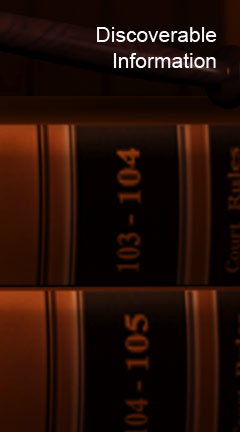Archival Notice
This is an archive page that is no longer being updated. It may contain outdated information and links may no longer function as originally intended.
Home | Glossary | Resources | Help | Course Map
Under the federal rules, the following are subject to disclosure:
- Defendant's oral statement(s).
- Defendant's written or recorded statement(s).
- Defendant's prior record.
- Documents and objects.
- Reports of examinations and tests.
- Expert witnesses.
Information may be disclosed in a variety of ways. Some examples of discovery components include:
- A request for production of documents, items, samples, property and specimens.
- Verbal deposition, or the informal process of taking sworn testimony from witnesses (including experts) before trial.
- Disclosure of oral, written or recorded statements (frequently found in law enforcement reports).
- Copying or inspecting documents, books, papers, data, photographs and computer records.
- Test results.
- Written interrogatories or questions posed to an opposing party or witness.
- Physical and mental examination of parties.
- Requests for admission (often designed to eliminate issues from trial).
When an expert is expected to provide opinion testimony in the case, a written summary of the anticipated testimony must include a description of the opinions, the bases and reasons for those opinions, and the witness's qualifications.
Additional Online Courses
- What Every First Responding Officer Should Know About DNA Evidence
- Collecting DNA Evidence at Property Crime Scenes
- DNA – A Prosecutor’s Practice Notebook
- Crime Scene and DNA Basics
- Laboratory Safety Programs
- DNA Amplification
- Population Genetics and Statistics
- Non-STR DNA Markers: SNPs, Y-STRs, LCN and mtDNA
- Firearms Examiner Training
- Forensic DNA Education for Law Enforcement Decisionmakers
- What Every Investigator and Evidence Technician Should Know About DNA Evidence
- Principles of Forensic DNA for Officers of the Court
- Law 101: Legal Guide for the Forensic Expert
- Laboratory Orientation and Testing of Body Fluids and Tissues
- DNA Extraction and Quantitation
- STR Data Analysis and Interpretation
- Communication Skills, Report Writing, and Courtroom Testimony
- Español for Law Enforcement
- Amplified DNA Product Separation for Forensic Analysts


